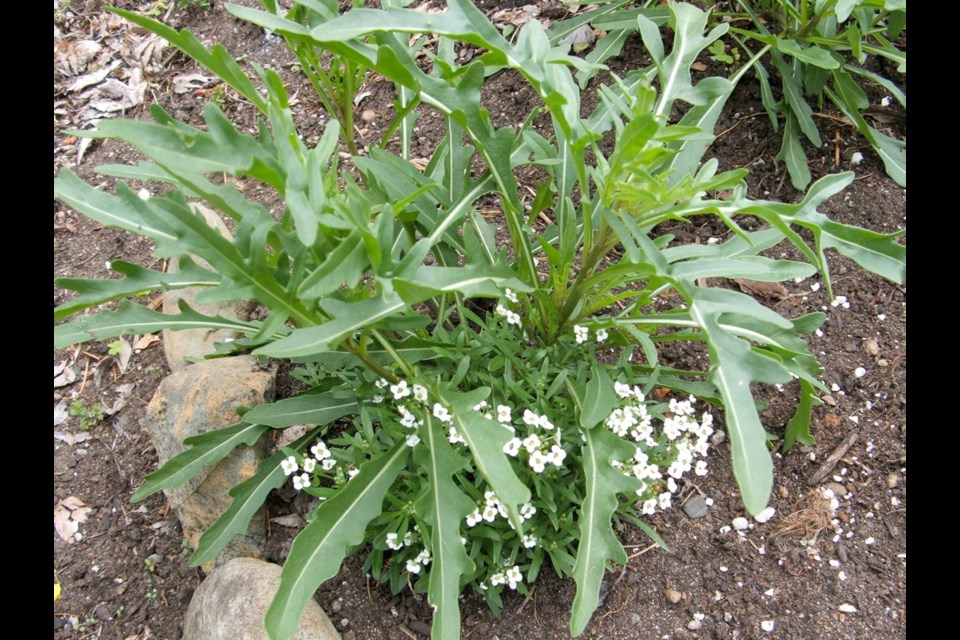Dear Helen: A plant that I think is a herb has turned up in my garden. It tastes great. From the photo I’ve sent can you tell me what it is?
K.I.
Your herb is wild arugula, called Sylvetta. It has narrower, more deeply serrated leaves and a spicier taste than the usual broader-leaved arugula. Self-sown patches of it grow in my garden every year. Most catalogues that list arugula offer this one as well as the more commonly grown version.
Dear Helen: I first noticed maggots in my raspberries a couple of years ago and read with interest your column about the spotted wing Drosophila (SWD). Following your suggestion, I placed two apple cider vinegar traps among the canes last month and caught quite a few flies. My question: Would growing marigolds under my raspberry canes work as a further defense against SWD?
P.S.
I’ve read a fair amount of research on limiting SWD damage to berries and soft fruits, and have come across nothing that refers to possible repellant plants or flowers. To pursue an answer to your question, I turned to the most reliable local source of accurate information I know on insect pests — Linda Gilkeson, an entomologist, author, and trainer in the B.C. Master Gardener program.
Linda replied with her usual clarity and generosity: Though research has been done on possible repellants, no effective ones have been found. Regarding marigolds, “There is no flower that will repel the SWD. … The only thing we can do is put a barrier between the flies and our fruit, and trap as many as we can over the winter so we have very few left in the spring.”
My traps are catching only female flies, the ones without the dark spots on the wing tips. Linda says that at this time of the year few or no males are left. Males appear later, and trapping is very important to do through the fall and beyond. The adult flies overwinter in the garden. Catching as many as possible before they find safe winter refuge reduces the numbers that can emerge in the spring to lay eggs in berries and fruit.
Dear Helen: When you wrote about apple cider vinegar traps to attract and control SWD flies, I set some of them out and caught quite a few. Then I started finding the containers tipped over and moved. Heavy stones inside the containers and burying them partially did not help. What animal might have done this? Is there a solution? I’m also wondering whether the size of the holes made under the container rim is important.
T.D.
I have heard that raccoons will sometimes find the traps to be of interest enough to move them about. Where this is an issue, hanging the containers is a solution. You can find photos of hanging apple cider vinegar traps on the internet.
Some are rather elaborate. The simplest one I found uses thin wire threaded through holes opposite each other near the container top. It’s on the PennState Extension site: extension.psu.edu/spotted-wing-drosophila-part-3-monitoring).
The size of hole made by an ordinary paper punch is ideal. I have had no difficulty using my paper punch to make four or five holes just below the rims of plastic containers. Holes that are bigger can admit larger insects, including beneficials that you don’t want to harm.
Dear Helen: Is there a variety of mint with pink and cream colouring on the leaves?
L.H.
I don’t know of one, and I cannot find any reference to one. There are several mints with cream, white or gold markings on their green leaves. Pineapple mint and ginger mint are examples.
The only commonly grown herb that I know of with pink and white markings on the leaves is Tricolour sage (Salvia officinalis ‘Tricolour’).
Plant sales. The Friends of Government House Gardens Society are pleased to announce that the Plant Nursery at Government House, 1401 Rockland Ave. in Victoria, will be opening to the public from Tuesday through Friday, 10 a.m. to 2 p.m. We ask that people wear masks and maintain social distancing. To welcome you back to the gardens most of the plants will be sold for $5 We will be accepting debit and credit cards only.



